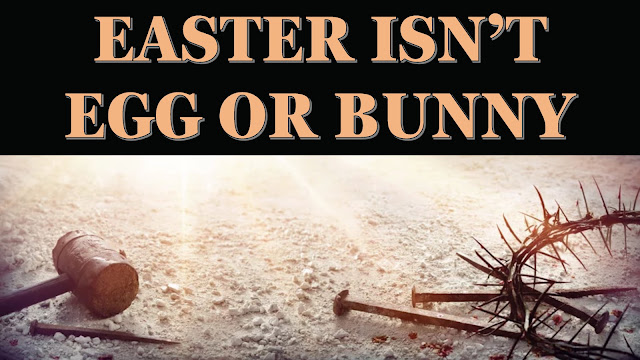FAST FOODS OF HUMAN RELIGIOSITY
It’s Easter Sunday. Christians everywhere are celebrating the resurrection of the Messiah, Jesus Christ of Nazareth, the only Begotten Son of God, the Redeemer of mankind.
Churches are parked with congregants dressed in bottom of the wardrobe attires. Clerics, garbed in medieval costumes, perform rites and rituals to commemorate the annual religious carnival. Following familiar liturgies and customary ceremonies, incense is burnt to wave off evil spirits and prayers are chanted to invoke the Holy Spirit.
Leading up to today is the Lent, the forty days preceding Easter dedicated to fasting and penance by the faithful. This is a re-enactment of the 40 days and 40 nights that Jesus fasted before commencing His earthly ministry of reconciliation.
Unsurprisingly, many of the religious traditions and symbols that are now regular fixtures of Easter cannot be found in the Bible. These practices derive their origin from pagan cultures of ancient times. The following are a few of them.
Originally, Lent required people to fast for 40 days (excluding Sundays). These days, most observers abstain from meat that isn’t fish on Fridays only, as well as give up an indulgence, like caffeine, chocolate, television, or social media (Good Housekeeping).
Egg has become a symbol of the resurrection. Since the 12th century the Lenten fast has ended on Easter with meals including eggs, ham, cheeses, bread, and sweets that have been blessed for the occasion. The use of painted and decorated Easter eggs was first recorded in the 13th century (Encyclopedia Britannica).
The custom of associating a rabbit or bunny with Easter arose in Protestant areas in Europe in the 17th century but did not become common until the 19th century. Other traditions, such as Easter candy, are among the modern additions to the celebration of this early springtime holiday (Good Housekeeping).
The tradition of sunrise Easter service dates back to 1732, when the first service was held in Germany by the Moravian Church. Easter Sunday is celebrated at the crack of dawn because Mary opened Jesus’s tomb early in the morning to find it empty (Good Housekeeping).
The custom of the Easter lamb appropriates both the appellation used for Jesus in Scripture (“behold the lamb of God which takes away the sins of the world,” John 1:29) and the lamb’s role as a sacrificial animal in ancient Israel. In antiquity, Christians placed lamb meat under the altar, had it blessed, and then ate it on Easter (Encyclopedia Britannica).
For millions of Christians who observe these Easter traditions, observing these rituals is the path to Heaven. By keeping these customs alive, they believe, they breathe life into their dying faith. Religious faithfulness is measured by how many of these rituals they are able to observe. To not do these things would amount to transgression against God’s commands. In the midst of all the rites and rituals, however, the significance of Easter is lost and forgotten.
Lifeless religious customs are like the leaves Adam and Eve got to cover their nakedness. Those enamored by religious traditions are lured into a false sense of security in their standing with God. Instead of a Christianity defined by righteous living and sincere love for neighbor, Christians are fed with superstitions, myths, and legends, all of which are fast foods of human religiosity. For these folks, Christianity is performative theater dramatized by public piety and private perversity.
The fundamental purpose of a Christian is to be salt of the earth and light of the world. The mission of the believer in Christ is to pour on the salt and turn on the light. To influence the world by being salt and light is all the Church is called to be. The reason our world is in an ever-increasing state of rottenness and decay is because Christians have lost their saltiness. The deepening darkness and rapidly spreading wickedness all around us are a direct result of the light of the Church growing dim.
Without a proper alignment with the true purpose of Jesus’s death and resurrection, all our Easter rites and rituals are nothing more than covering up our nakedness with leaves.



Comments
Post a Comment